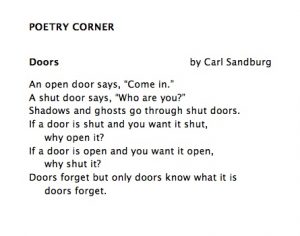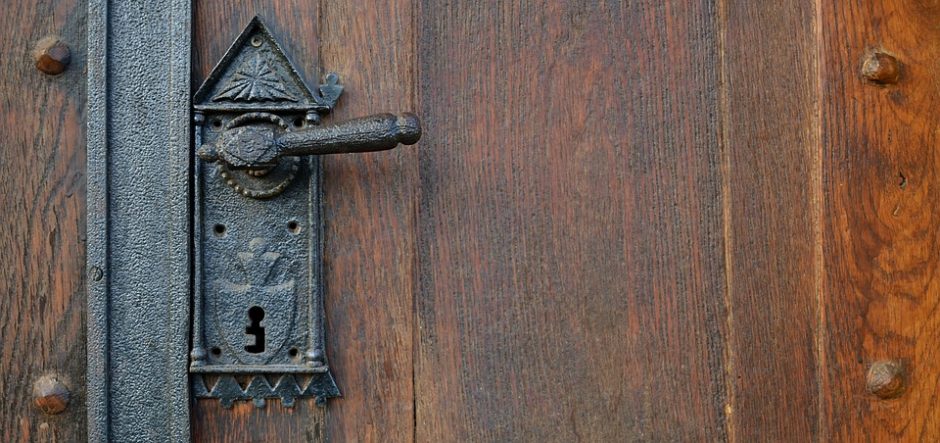If you wish, you can hear the sermon as it was preached from the UCJ pulpit. Simply click the play button below:
Delivered to the United Church of Jaffrey
April 9th, 2017
Psalm 118:19-29 | Matthew 21:1-11
Open to me the gates of righteousness!
Can you hear the great power of these words?
Can you hear, how this proclamation, from the One hundred and eighteenth psalm, seems to ring down through the ages, like a clear bell?
Open to me the gates of righteousness!
The biblical scholar Robert Alter has called the book of psalms the “hymnbook of the Jewish people” and, indeed, even after putting up with translation after translation, the psalms reach out and grab us with undiminished power, because they are not just words,
They are songs.
They are not just songs,
They are prayers.
They are not just prayers,
They are hopes,
Fears,
Longings,
Desperate cries for help,
Laments,
And even demands!
Have you ever heard of a prayer spoken as a demand?
We do not speak to God in the language of demand.
We speak to God with the language of humility!
Prayer, I have said before, form this pulpit, is the language of humility!
But can we also speak to God through the language of demand?
This psalms seem to give us this license…
Psalm 118 does not say:
“Dear God, if I a promise to be good, would you do me a favor and please open to me the gates of righteousness?”
The psalmist does not tip-toe through the tulips.
The psalmist does not beat around the bush.
This is not the language of “please and thank you.”
The psalms say it strong.
The psalms say it clear, like a trumpet!
Open to me the gates of righteousness!
Open to me the gates of righteousness!
*
 In the today’s poetry corner, there is a poem by Carl Sandburg entitled “Doors.”
In the today’s poetry corner, there is a poem by Carl Sandburg entitled “Doors.”
Sandburg reminds us that there are two kinds of doors, and these two kinds of doors say two different things.
An open door says, “Come in.”
A shut door says, “Who are you?”
Sandburg’s poem is not a psalm.
The poem is not making a giant proclamation about salvation and the universe.
It is doing something more humble than that. It is making an observation about human life.
Yes we do.
And with each door, we make ask ourselves a question.
The question of the door.
Should we open the door? Or should we close the door?
Open, or closed? That is the question of the door.
When we shut the door, we ask the person on the other side “who are you?”
If we leave the door open, we tell the person on the other side: “come in.”
An open door says “I trust you.”
A closed door says “I’m not sure about you.”
What should we do?
Should we trust people and leave our doors open?
Or should we be safe and shut our doors?
And God?
What does God do?
Does God “open the gates of righteousness”?
Or does God “close the gates of righteousness”?
*
The human answer to the question of the door, is “it depends.”
We answer the question of the door with an “it depends” tool.
The “it depends” tool is called a “lock.”
Sometimes we leave the door open,
And sometimes we close it and lock it.
This is because sometimes we know enough about the people on the other side of the door to trust them…
Come in! we say.
But most of the time we simply don’t know enough about the people who might come up to the door…
Who are you? I ask.
It is hard to trust you, because I don’t know you.
How can I trust you?
There is an old Sufi saying.
(Sufism is a sect of Islam that seeks God through mystical experience.)
The saying goes like this:
“Trust in God, but tie up your camel.”
“Trust in God, but tie up your camel.”
That says it all, doesn’t it?
This is the human perspective on the question of the door.
We trust that there is an ultimate goodness in the universe, but we are not fools. We praise God for making camels, but we know that camels wander away, or are stolen.
That’s just the way things are.
*
But what about God?
What is God’s answer to the question of the door?
When we use the powerful words of psalmist and proclaim “Open to me the gates of righteousness!
What should God do?
Should God trust us and say “come in?”
Or should God look at us suspiciously and ask “Who are you?”
Now if we take the traditional view of things, and think of God as “all knowing, all powerful, and entirely good” we see, immediately, that God’s answer to the question of the door is likely to be different from ours.
If God is all-knowing, then, unlike us, God knows everything there is to know about the person who is at the door.
God does not have to wonder about the person’s motives. God knows.
The all-powerful part means that God is more powerful than any person who comes to the door.
This, of course, means that God has nothing to fear from the person at the door.
The all-good part, means that God will want to throw open the gates of righteousness rather than bar them. Barring the gates would mean keeping some people away from God – which surely is not as good as being with God.
Knowing all, God is not suspicious, as we are.
All powerful, God has no need to fear.
Being entirely good, God wants us to come in.
If we follow this traditional view of God, it seems that God would at least be at liberty to leave the door wide open at all times.
But is this what God does?
There are many schools of thought on this question.
Every religion, including Christianity, has within it a powerful us-an-them tendency that essentially says: “We are saved and they are damned.”
Ultra-conservative “Wahhabi” Muslims of Saudi Arabia, for example, believe that they alone have the correct understanding of the Koran, and that not only people of other religions, but even other Muslims, are all damned to perish in hell for eternity.
But we need not go so far afield to find this tendency. The Puritans who were our forbears in the Congregational Church believed in a strict form of Calvinist theology that stated, quite bluntly, that God chose an “elect” group of people who were predestined to be saved, and everyone else was lost.
And naturally, the “elect” were “us.”
How convenient!
Religion has a troubling relationship with the question of the door.
A moment ago it seemed reasonable to think that God would fling open the gates of righteousness and welcome us all without suspicion or fear.
But institutional religion seems to take a much harder line on the door question. Religions often turn God into a kind of stern, embittered figure who only opens the door a crack, to admit only the proper “kind” of people.
Salvation becomes a kind of club. A place reserved for people who know the secret knock, or handshake.
Is that really our God?
Really?
Is God really that petty? Oh sorry. Your interpretation is not quite correct, so, you can’t come into the gates of righteousness. You love the wrong kind of person. You listen to the wrong kind of music. You pray the wrong kind of prayers. So, tough luck.
I don’t think so.
And here’s why.
Consider the story of Palm Sunday.
Palm Sunday celebrates Jesus’ return to Jerusalem.
This fascinating story has, embedded within it, the problem of the door.
Jesus is welcomed by the people of Jerusalem, who wave palm leaves and sing Hosanna’s.
This all seems pretty promising.
Jesus comes to the door, and the door is opened.
But Jesus is not just another person coming to the door.
Jesus comes to Jerusalem as God.
How do we know this?
Consider the donkey…
Jesus lived before IPhones. There was no app to tell him there would be a donkey waiting for him.
When Jesus returns to Jerusalem, he knows about the donkey because he knows what is going to happen before it happens.
The Bible explains this in one of two ways – he is either a prophet, or he is the Messiah.
And since Jesus knows what will happen before it happens, he, of course, knows what it means for him to return to Jerusalem.
No one else knows.
But he knows what lies in store…
He knows about the betrayal
He knows about the arrest
He knows about the denial
About the conviction and the flogging.
No one else knows,
But he knows…
He knows about the crucifixion.
This story flips problem of the door.
In this story, we are not at the door.
God is at the door.
We open the door
And God comes in.
God comes in, even though God knows what is going to happen.
At first there are palms, but the door that God has walked through is a door into human frailty.
The door that God has walked into is the door of human broken-ness.
This is a door that leads to horrible violence.
A door that leads to death.
There is plenty of reason for God to be suspicious.
But God walks in anyway.
Vulnerability walks in.
Love walks in.
*
Open to me the gates of righteousness!
The psalms are a clear, hymn-like bell that ring across the centuries.
Open to me the gates of righteousness!
Not long ago, in one of the governance meetings, here at the United Church of Jaffrey, the question arose:
“Should we lock the doors to the sanctuary?”
Currently, the doors to the sanctuary are unlocked at all times – 24/7/365. Anytime of the day or night, that anyone wants to come into this sanctuary, they can.
But is this a sound policy?
Aren’t we asking to be robbed?
Are homeless people going to sleep in our pews?
These are good questions.
Trust in God, but tie up your camel!
Believe in goodness, but don’t let the world play you for a fool!
The governance committee considering the question sat for a moment in silence.
Then someone, I can’t remember who, told a story. A person in town had been feeling suicidal. That person tried to go to a church, but the churches were locked.
Eventually the person found our church.
Our church doors were open.
Our church doors were open.
Today, in Jaffrey, we throw open the doors of vulnerability.
We throw open the doors of love.
Not because we are foolish
But because we follow the example of Christ, who was willing to sacrifice all, for love.
Today, in Jaffrey, we do not say
Open to me the gates of righteousness…
We say…
Open to all the gates of righteousness!
Amen.


